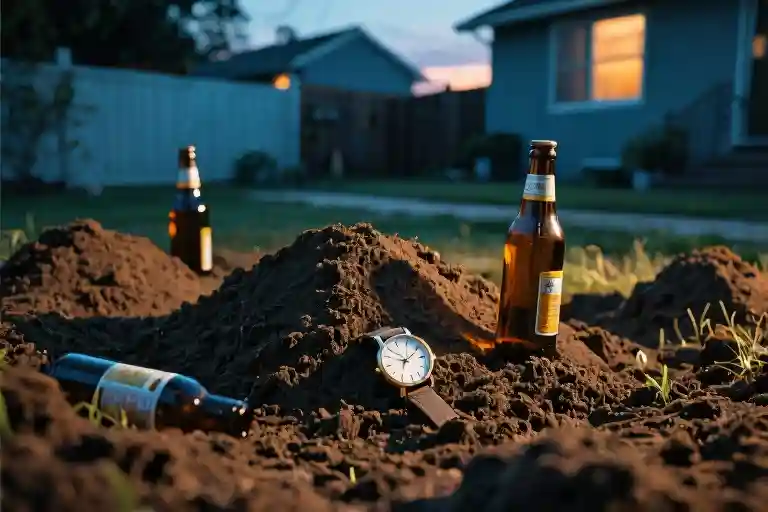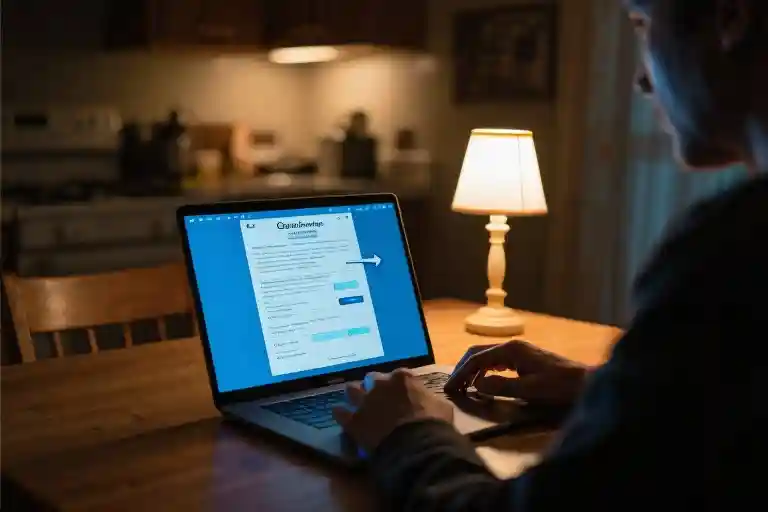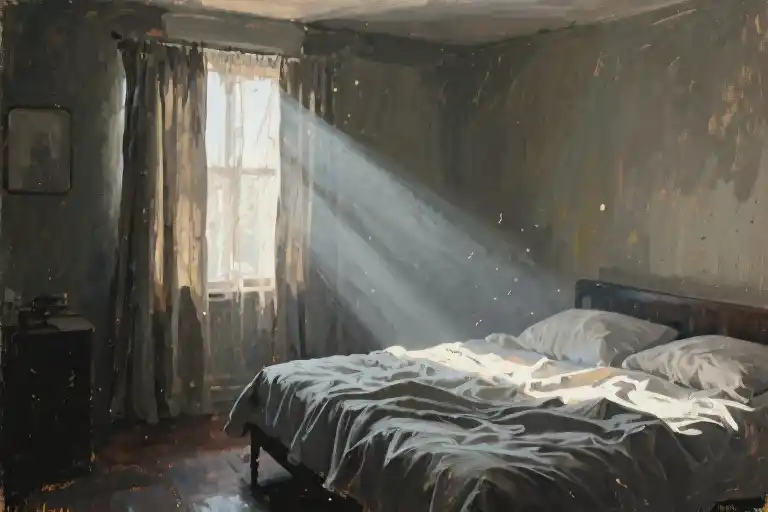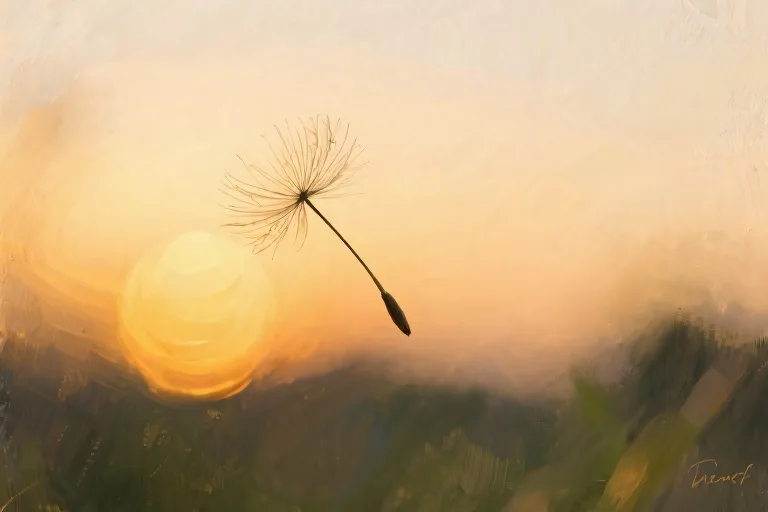The bottle caps scattered across my dashboard looked like miniature tombstones under the flickering streetlights. We drank beer at Dad’s funeral—not the solemn toast one might expect, but something raw and necessary. My brother’s fists pounding against the polished casket had left smudges on the brass handles, his dress shoes scuffing the Astroturf as the priest pretended not to notice. I watched his knuckles turn white, then red, then purple, the colors shifting with each unanswered question he hammered into that sealed box.
No one intervened. Not when his tie dragged through the fresh grave dirt, not when his choked sobs disrupted the canned organ music. Our relatives stood frozen in that peculiar funeral limbo—too uncomfortable to join the outburst, too guilty to look away. I counted the wrinkles on Uncle Frank’s forehead until they blurred together. The scent of embalming fluid mixed with my brother’s sweat created a nauseating perfume that clung to my collar for days.
Later, in the car, the silence between us hummed louder than the engine. He kept wiping his palms on his slacks, though the coffin’s veneer had left no visible residue. ‘Home?’ he asked suddenly, staring at a traffic light’s reflection in the side mirror. His face cycled through green, yellow, red—an emotional stoplight no one had taught us to interpret. The dashboard clock blinked 00:00, stuck in that liminal space between yesterday’s grief and tomorrow’s uncertainty.
We’d become experts at burying things long before Dad’s funeral. Childhood pets, broken toys, letters we were too afraid to send. But this was different. The weight in the car wasn’t just from the six-pack between us; it was the unspoken realization that some graves can’t be marked with neat little headstones. My brother’s trembling fingers traced the bottle cap’s jagged edges as the radio played static—the same sound I’d heard when holding the phone to Mom’s hospital bedside years earlier, waiting for a goodbye that never came.
Outside, the world continued with unbearable normalcy. A woman laughed into her phone. A dog barked at a squirrel. The sun set behind the funeral home’s neon ‘Chapel B’ sign as if death were just another appointment slot. My brother cracked open another beer, the hiss of carbonation mimicking the sound of dirt hitting a coffin lid. Neither of us mentioned the fresh mud still caked under his fingernails, the biological evidence that today’s burial had been real, tactile, inescapable.
When the streetlights buzzed to life above us, they illuminated something unexpected in my brother’s face—not sorrow, but relief. The kind that comes when you finally stop running from a shadow only to realize it was your own all along. He pressed a cold bottle into my hand, our fingers brushing briefly over the condensation-slick glass. No toast, no words. Just two men drinking in a parked car, trying to drown what couldn’t be buried.
The dashboard bottle caps rattled like loose teeth as we pulled out of the funeral home parking lot. My brother sat passenger-side, methodically peeling the label from his beer with fingernails still caked in cemetery dirt. The same hands that had pounded our father’s casket an hour earlier now worked with strange delicacy, as if unraveling some invisible thread between us.
‘Let’s get more,’ he said when we passed the Exxon where Route 9 crosses Millard. The neon sign buzzed pink against the twilight – the same shade as the bubblegum we’d shoplifted here twenty years ago. I could still taste the artificial watermelon flavor that used to make our mother sigh. ‘For the road.’
The clerk didn’t recognize us as the grown versions of those sticky-fingered boys. My brother paid this time, dropping coins that rolled beneath the snack rack where we’d once hidden Jawbreakers. The register’s beep sounded exactly as I remembered, that same two-note chime that used to spike our adrenaline.
Back in the car, the silence between us hummed louder than the engine. My brother twisted the radio knob through static bursts – fragments of country songs, evangelical sermons, dead air. Each failed station felt like another abandoned conversation. When he finally landed on a clear frequency playing ‘Knockin’ on Heaven’s Door,’ we both froze. Dad’s favorite. The coincidence pressed against my ribs like a third passenger.
‘Home?’ my brother asked during the guitar solo, staring at the traffic light ahead. His face cycled through its colors – green to yellow to red – while mine stayed fixed in the dashboard glow. The word hung between us, weighted with complications. His version meant the peeling blue colonial on Sycamore. Mine was a studio apartment forty minutes east with takeout menus piled on the fridge.
I took the turn toward Sycamore. The road had been repaved since we’d last biked it, but the pothole outside Mrs. Callahan’s still jarred the suspension in the same spot. My brother’s beer sloshed onto his slacks without comment. Some stains don’t matter after you’ve wept into a parent’s coffin.
As we approached the old neighborhood, the streetlights flickered on one by one – a mechanical wave that illuminated how little the trees had grown compared to us. The houses all looked smaller too, except ours. The dark shape of it loomed between two glowing windows like a missing tooth in a bright smile. No porch light. No visible life. Just the silhouette of whatever we’d left buried there years before grief made archaeologists of us both.
The Phantom at the Door
The porch light flickered like a dying pulse as we stood before the warped front door of our childhood home. That distinctive crook in the elderly man’s spine when he answered—the exact same curve Dad developed after years bending over engine blocks—made my breath catch. His yellowed undershirt clung to protruding shoulder blades in a way that mirrored how Dad’s work shirts always hung.
“I’ve been here my whole life,” the man whispered to his own slippers. The tremor in his voice carried the same rasp Dad had after his third whiskey. For one vertiginous moment, I genuinely wondered if grief had reshaped reality itself.
Sensory Overload
The house exhaled when we stepped inside—a stale breath of cat urine, vinegar-soaked vegetables, and something sweetly rotten beneath. My shoes stuck slightly to the newspapers carpeting the floor, each reluctant step making a sound like tape being peeled from skin. The walls had disappeared behind towers of National Geographics and precariously stacked chairs. In the kitchen, rows of mason jars lined every surface, their murky contents glowing faintly in the streetlight bleeding through grimy windows. One jar held what looked like a decomposing pear suspended in amber liquid—a perfect still life of decay.
Navigation Through Ruins
My brother moved through the clutter with unsettling familiarity, sidestepping piles as if following invisible paths only he could see. When he reached what had been his bedroom, two dressers blocked the doorway like sentinels. He squeezed through the gap anyway, disappearing into the darkness beyond. I remained trapped at the threshold, staring at the dresser handles—their brass worn smooth by decades of hands that weren’t ours.
The Resemblance
The old man kept studying me with watery eyes that refused to focus properly. Every time he turned his head at that particular angle, the liver spots on his neck arranged themselves into the same constellation Dad had. When he coughed into a handkerchief, the three-note rhythm matched Dad’s smoker’s hack exactly. The synapses in my brain fired wildly between logic and longing—part of me wanted to ask if he remembered teaching us to change spark plugs in ’98.
Threshold Moment
A draft from somewhere deep in the house carried the faintest whiff of Dad’s signature mix of motor oil and Irish Spring. My brother called from the backyard, his voice muffled through layers of time and drywall. The old man finally spoke clearly: “You boys shouldn’t play near those garden beds. The ground’s soft there.”
Neither of us had mentioned being brothers.
The Time-Warped Bedroom
The hallway leading to my brother’s childhood bedroom had become an obstacle course of stacked furniture and yellowed newspapers. He navigated it with unsettling familiarity, his shoulders brushing against dressers that hadn’t existed in our youth, his feet finding invisible pathways through the debris. From the doorway, I watched as he disappeared into what should have been an impassable space – two massive oak dressers blocking the entrance like bouncers at a club we’d been banned from decades ago.
“There’s too many dressers in here,” his voice floated back to me, muffled by the layers of time and clutter. The observation carried the weight of sibling estrangement stories – a simple statement about furniture that really meant why did everything have to change without us?
I remained stranded at the threshold, my fingers tracing the doorframe where our mother had marked our heights in pencil. The grooves were still there beneath layers of paint, but my fingertips came away dusty. This was the first tangible evidence that unconventional mourning rituals could take many forms – sometimes it’s pouring beer on childhood graves, sometimes it’s being physically unable to enter the spaces where your memories live.
Through the narrow gap between dressers, I caught glimpses of my brother moving through the room like a museum visitor. He touched surfaces with reverence, his palm flat against the windowsill where we’d once lined up action figures for elaborate award ceremonies. The moonlight caught his profile just right, and for a moment I saw the twelve-year-old who’d buried X-Men toys with solemn dignity.
“Remember when we turned this whole room into a carnival for our toys?” he called out. His voice cracked in the same place it had when describing Cable’s tragic Ferris wheel accident earlier. The memory floated between us, fragile as the cobwebs stretching across the ceiling corners.
From my position in the hallway, I could see three versions of the room simultaneously: the present-day disaster zone with its peeling wallpaper and stranger’s belongings, the ghostly overlay of our childhood sanctuary with its glow-in-the-dark stars on the ceiling, and some transitional version from after I’d left for college but before our parents died – a room frozen in complicated grief before the concept had a name.
The old man who now lived here hovered at the end of the hallway, his curved spine making him appear like a question mark personified. He studied me with an intensity that suggested he too was seeing multiple versions of reality – perhaps wondering which iteration of this house’s history I belonged to. When our eyes met, I noticed his left iris had the same cloudy ring my father’s developed in his final year.
“I can’t get through,” I admitted, pushing uselessly against a dresser. The admission felt heavier than the furniture. My brother didn’t offer help – whether because he wanted this moment alone with the past, or because some part of him understood I needed to say those words aloud.
Through the narrow opening, I watched him kneel beside what had been his bed. His fingers disappeared beneath the dust ruffle, searching for… what? Childhood treasures? Proof we’d existed here? When his hand emerged empty, the slump of his shoulders told me everything about how memory and reality in grief never quite align.
He finally emerged from the room covered in a fine layer of dust, as if he’d been rolling around in the ashes of our shared history. Without a word, he reached into his jacket pocket and pulled out a bottle cap from our gas station beers – one of the “miniature tombstones” we’d flicked onto the dashboard earlier. With deliberate care, he wedged it into the doorframe beside our mother’s height markings, creating a new kind of memorial.
“Let’s check the backyard,” I suggested, because some graves are easier to visit than others. As we turned away from the bedroom, I noticed my brother’s fingers trailing along the wall, collecting decades of paint chips and memories under his nails. I wondered if he’d wash them off later or let them linger like the scent of kitty litter and pickled vegetables that clung to our clothes – sensory reminders that some returns are temporary, and some goodbyes take multiple attempts.
The Backyard Burial Ritual
The damp earth clung to our fingers as we knelt in the overgrown garden, moonlight carving shadows where Mom’s tomatoes once thrived. My brother’s wristwatch caught the pale glow when he unbuckled it—that stainless steel Timex our father gave him for graduation, now ticking its final minutes above a fresh hole in the ground.
“Remember Toby’s funeral?” His voice cracked like the backyard fence we’d climbed as kids. I watched his thumb brush dirt from the watch face, a gesture so like Dad polishing his reading glasses that my breath hitched. The scent of wet soil and stale beer between us became suddenly overwhelming, that peculiar cemetery smell of life persisting around death.
Flashback dissolved into reality as my fingers found the photograph in my wallet—Lisa from junior year, her smile frozen behind laminate. The edges had yellowed where I’d tucked it behind credit cards, secretly carrying her like a splinter for fifteen years. When I pressed my palm against the cold earth, the ground yielded with the same reluctant give as Dad’s hospital mattress in those final weeks.
Three feet away, my brother was conducting his own ceremony. His shoulders shook with silent sobs as he arranged the watch just so, the way we’d positioned Cable the X-Men figure after his fatal Ferris wheel accident. That childhood burial felt rehearsed now—our tiny hands patting dirt over plastic limbs while Mom watched from the kitchen window, neither approving nor stopping our morbid play.
“We should say something,” he whispered. But what words exist for burying the artifacts of love that outlive their usefulness? The watch that no longer marked visits home. The photograph of a girl whose laugh I’d forgotten. We became archaeologists of our own hearts, excavating relics too painful to display but too precious to discard.
When his beer bottle tipped over Cable’s unmarked grave, the foam bubbled through cracks in the soil like the ghost of our childhood mischief. I mimicked the motion over Lisa’s photo, watching dirt turn to mud over her features. There was power in this ritual—not closure, but acknowledgment. These tiny funerals for living griefs.
His tears came openly now, great heaving sobs that echoed off the neighbor’s toolshed where Dad kept his fishing gear. I envied that rawness even as I recoiled from it, my own mourning trapped beneath layers of practicality like seeds waiting for winter to pass. The symbolism wasn’t lost on me as I pressed earth over Lisa’s face: we bury what we cannot bear to carry, but the weight never truly disappears.
Later, in the car’s fluorescent glow, I’d notice the garden soil beneath his fingernails matched the cemetery dirt still on my dress shoes. Two types of burial ground clinging to us—one sanctioned by society, the other born of our desperate need to grieve beyond the boundaries of tradition. The watch’s absence on his wrist seemed louder than any eulogy.
Complicated grief doesn’t follow schedules or respect propriety. It slips through cracks in funeral etiquette, emerging later in midnight gardens and gas station parking lots. That night taught me family trauma healing sometimes requires burying more than bodies—it demands interring the unspoken hurts, the missed opportunities, the versions of ourselves that died with them.
As we drove away, I caught him staring at his bare wrist in the passing streetlights. Neither of us mentioned the fresh mounds in Mom’s garden or how the backyard now held more of our history than the house ever could. Some silences grow roots. Some burials grow gardens.
The Vanishing Act in the Rearview Mirror
The motel parking lot lights flickered like dying fireflies as I shifted the car into park. My brother sat motionless in the passenger seat, his face still streaked with dirt from our backyard burial ceremony. The dashboard clock read 2:17 AM, but time had stopped meaning anything hours ago when we’d toasted our father with gas station beer beside his grave.
‘You sure this is your stop?’ I asked, eyeing the cracked concrete walkway leading to rooms with peeling numbers. The neon vacancy sign buzzed overhead, casting his profile in intermittent red glow. He didn’t answer – just reached for the door handle with that same determined jerk he’d used to slam fists against Dad’s casket earlier.
Three things happened simultaneously as he exited the car:
- A half-empty beer can rolled from his jacket pocket, foaming amber liquid onto the asphalt
- The motel room curtains fluttered in a nonexistent breeze
- My rearview mirror caught his reflection walking toward Room 114 before the angle shifted and he simply… wasn’t there
I waited thirteen minutes (counted by the still-ticking dashboard clock) before getting out to investigate. The abandoned beer can lay on its side where he’d dropped it, condensation drawing strange hieroglyphics in the parking lot dust. No footprints led away. Room 114’s door stood slightly ajar, revealing a made bed and television playing static to an empty chair.
Back in the car, I found his wristwatch tucked between the seats – the twin to the one we’d buried hours earlier in our childhood backyard. Its hands had stopped at 9:48, the exact time Dad’s heart monitor had flatlined. When I pressed it to my ear out of habit, I heard not silence but distant, rhythmic scraping – like someone digging in soft earth.
That’s when the radio crackled to life without being touched, playing ‘Cat’s in the Cradle’ at half-speed. Dad’s most hated song. I left the watch on the passenger seat and drove away slowly, watching the motel disappear in my mirrors. In the backseat, unseen but palpable, something shifted weight.
The Archaeology of Absence
Return visits became my secret ritual. Tuesdays and Sundays at dusk, I’d park across from our old house watching for movement behind the overgrown hedges. The elderly resident never appeared, though sometimes the backyard gate swung open without wind.
On my third visit, I found:
- A fresh mound of dirt beside Toby’s grave
- My brother’s motel keycard half-buried near the fence
- An empty beer can identical to the one from that night
The earth gave easily under my fingers. Six inches down, my nails scraped against something smooth – the corner of a photograph. My high school girlfriend’s face stared up through a film of soil, though I’d buried my copy miles away near Toby’s resting place. Her lips moved soundlessly against my fingertips before I reburied her hastily.
Neighbors reported no sightings of my brother. The motel had no record of Room 114 ever being rented. Yet every time I visited our childhood home, new evidence appeared:
- A jacket sleeve snagged on the fence
- Freshly turned earth in the vegetable patches
- The scent of spearmint gum he always chewed
Memory and reality blurred like rain on windshield glass. Had we truly shared those beers at the funeral? Had his fists really left dents in Dad’s casket? The only tangible proof existed in my car – that stopped wristwatch whose ticking I now heard in my dreams.
The Unfinished Goodbye
Last night I drove past the house at midnight. A silhouette crouched in the backyard, shoulders shaking with silent sobs. When I called his name, the figure dissolved like smoke in moonlight. Only the freshly dug graves remained – dozens now, arranged in concentric circles radiating from Toby’s original plot.
I’ve stopped trying to understand. Some griefs resist burial. Some brothers exist only in the corner of your eye, in the static between radio stations, in the phantom weight of a wristwatch you swear you left on the passenger seat but keep finding in your pocket.
The beer can still sits in my cupholder. Sometimes, when the moon hits it just right, I see our reflections from that night – two boys playing at being men, toasting a ghost who taught us how to vanish.
The Unmarked Graves of Memory
The motel parking lot swallowed his silhouette whole as I drove away, the neon vacancy sign staining my rearview mirror pink. Months later, I still find myself circling those familiar streets like a satellite pulled into orbit by some invisible gravity. The old house stands unchanged—that stubborn blot of darkness between glowing windows—but the backyard tells another story.
Fresh mounds appear between Mom’s collapsed garden borders. Some no larger than a coffee can, others stretching the length of a forearm. The earth here breathes differently now, rising and falling with secrets I wasn’t meant to witness. Last Tuesday, I counted seventeen disturbances before the motion sensor light chased me back over the fence.
Complex grief works in spirals, not straight lines. The psychology journals say this when describing how mourners revisit the same mental landscapes, each pass uncovering new layers. My brother understood this instinctively. His midnight excavations weren’t about burying—they were desperate archaeology. That Casio watch he planted by the fence post? Just another time capsule for futures that never arrived.
Sibling estrangement leaves phantom limbs. Three times now I’ve braked for men in navy peacoats turning familiar corners. Once I followed a figure hopping fences with his left shoulder slightly raised—the same hitch he’d developed after that bicycle spill in ’98. But the streets here birth doppelgängers like dandelions; every shadow could be him or Dad or some hybrid ghost we’ve conjured between us.
The most unsettling discovery came during last month’s thunderstorm. Kneeling where we’d interred my high school girlfriend’s photo, my fingers found not damp soil but something smooth and angular. A Zippo lighter engraved with initials I didn’t recognize. This wasn’t my brother’s handwriting in the dirt. Which means someone else is conducting their own unconventional mourning rituals in our childhood yard—or I’m digging holes no one else can see.
Maybe that’s the real lesson in all this. Family trauma healing isn’t about finding answers, but learning to live with the questions. Those mounds behind the house keep multiplying because grief refuses neat conclusions. Every resolved memory births two new mysteries, every unearthed artifact reveals deeper strata of ‘what if.’
Sometimes at stoplights, I press my palm against the passenger seat where his beer bottle left a condensation ring. The fabric’s been dry for months, but my skin still expects that cool dampness—the way we expect the dead to answer when we whisper to their photographs. The car still smells faintly of the gas station’s stale pretzels and motor oil, that peculiar scent of provisional comfort.
Memory and reality blur like rain on windshield glass. I could swear I see him some mornings, a smudge of movement between the oak trees where we buried Cable the X-Men figurine. The rational part of me knows it’s just stray cats or wind-stirred leaves. But the brother who held my shoulders as we sobbed over a plastic grave? He’d tell me to stop worrying about what’s real. Some truths only grow in the dark, nourished by things we dare not say aloud.
So I’ll keep circling these blocks, watching for fresh dirt under the streetlights. Not because I believe he’ll return, but because this ritual—this persistent, irrational tending—is how I keep them both alive. Dad in the curve of that old man’s spine. My brother in every turned head that isn’t his. Myself in the act of searching for what was never truly lost, just waiting to be unearthed again.





